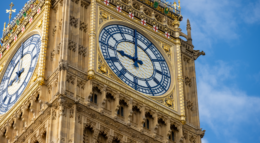
What is the case for a second referendum?
More and more politicians are backing a second referendum on Brexit, but why? Bruce Newsome assesses the case for a Brexit referendum re-run.
Back in February, the chief of a campaign for a second referendum ("Best for Britain") defended her acceptance of a huge donation from Hungarian billionaire (George Soros) by claiming that she wants "simply to give people a proper say on the deal with the European Union, including the option of remaining," "a meaningful vote on Brexit," "to help people to take a more active role in our society," to produce an electorate "more democratically engaged." She doesn't explain why she thinks the first referendum was not "a proper say," "meaningful," "democratically engaged," or inclusive of an "option of remaining." Her argument is unfounded at best, contrary to the facts at worst.
In March, "Best for Britain" launched a legal claim that existing legislation guarantees a second referendum once May signs Britain back into membership of individual EU agencies. That's a legal argument (about a legal obligation) not a prescriptive argument (about what would be the right thing to do). Indeed, spokeswoman Eloise Todd said: "This is not about Leave or Remain. It's about making a democratic choice according to our constitution, given that many are worried about Brexit." Her argument doesn't follow: her argument is constitutional, yes, but implies that a second referendum would be "a democratic choice" where the first referendum was not – that's a contradiction that makes her argument illogical. More insulting is the implication that a vote isn't democratic unless she gets the result she wants.
In March, the Liberal Democrats' leader (Vince Cable) revealed – in a prepared speech to his party conference, just to be clear this was no gaffe – that his wish for a second referendum is simply prejudicial. He said: "I confess that my own initial reaction to the referendum was to think that maybe there was little choice but to pursue Brexit. What changed my mind was the evidence that Brexit had overwhelmingly been the choice of the older generation", who voted for "nostalgia," for a time when British "passports were blue, faces were white, and the map was coloured imperial pink." That's not an argument so much as a prejudice.
Subsequently, Nick Clegg (former leader of the Liberal Democrats) came out to say that the transition deal does not change his commitment to a second referendum. His arguments are always incoherent and hyperactive but seem to revolve around the assumption that voters were too stupid not to be misled. Again, that's not an argument so much as a prejudice.
Most Labour Parliamentarians are in opposition to their Party leader Jeremy Corbyn, who supports the Prime Minister's position that the referendum of 2016 has been decided already (although they decide for themselves what is meant to be implemented as "Brexit"). In March, Corbyn tried to stem the rise in internal opposition by sacking his Shadow Secretary for Northern Ireland (Owen Smith) for calling for a second referendum, but Corbyn is a notorious u-turner, and could easily decide to win back the majority of Labour Parliamentarians by joining their call for a second referendum.
Tony Blair subsequently spoke at Speaker's House in Parliament to urge Parliamentarians to vote down a Brexit deal in order to give the people a second referendum. As we've come to expect, Blair's argument is more pathos than logos. As soon as the third sentence, he declared that at the time of the referendum, "self-evidently, there was no knowledge of what the alternative to life outside the EU would look like." No knowledge? Think about that: according to Blair, all of us voters were just bashing at typewriters like infinite monkeys trying to produce a work of Shakespeare, without any knowledge of what we were doing. There's that old prejudice again: when democracy doesn't produce the result you want, pretend the voters were ignorant.
This week, Blair must have tipped off David Miliband (formerly Blair's foreign secretary), who used the New Statesman magazine to second Blair's call for "Parliament to speak up for the foundations of our security and our place in the world," as Miliband put it. Yet Miliband claimed to offer a new "argument, absent until now," for holding a second referendum. What he came up is hilarious – I couldn't have made it up in my wildest satirical dreams: the election of Donald Trump! As Miliband puts it in cloying Blair-English: "This is plenty reason to reconsider the fateful step of leaving Europe's political alliance." That bumps Miliband past Blair as this week's barmy Brexit-basher of the week. He's referring to the same Donald Trump who has been urging Britain to get on with Brexit so that Britain can get a favoured trade deal with the US. Miliband ignores that missed opportunity: he just throws out caricatures that we already know: Trump is a buffoon; and the world is "dangerous". Miliband sits in his well-paid, undeserved job in New York calling out to his old cronies in Britain through the magazine of the pseudo-intellectual left by reminding them, "Trump is a buffoon: see, I agree with you new leftists who turned your back on Blairism. Now I've got your attention, consider me one of your own on a second referendum too." Yet his long-winded article is utterly irrelevant to a second referendum: he makes a long list of complaints about the state of the world, which he blames on Trump, Russia, and Syria, without any link to a second referendum, except in the title: "Why Labour must back a new Brexit referendum." Frankly, I suspect he's been kicking around an article complaining about the state of the world for some time, then this week he stuck this title on it, to be fashionable. He must think that his readers are so stupid as not to notice that his argument is irrelevant to his title; perhaps he's mostly right on that because I've seen nobody else critique it.
The argument for a second referendum seems to be mostly that British voters are too stupid or prejudicial to be trusted. If so, a second referendum would not solve that. We could just as well use the same argument to overturn a second referendum too – the argument is circular. At bottom, the arguers are hypocrites: they use stupid and prejudicial arguments to claim that the majority voters of June 2016 were too stupid and prejudicial to be honoured – at least until they vote Remain.















